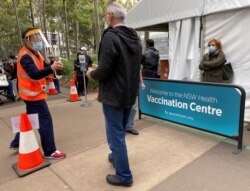The delta variant of the coronavirus now accounts for 83% of new cases in the U.S., according to the Centers for Disease Control and Prevention.
During the week of July 3, the variant accounted for 50% of new cases.
“The best way to prevent the spread of COVID-19 variants is to prevent the spread of disease, and vaccination is the most powerful tool we have,” Dr. Rochelle Walensky, director of the Centers for Disease Control and Prevention, said during a U.S. Senate hearing Tuesday.
The delta variant, which was first detected in India, reportedly spreads more easily than other iterations of the COVID-19 virus.
Meanwhile, the U.S. State Department is urging Americans not to travel to Britain because of the rising levels of new COVID-19 cases there.
The State Department raised its travel advisory for Britain to its highest level on Monday, following a similar action taken by the CDC earlier in the day.
Both agencies said if people must travel to Britain to make sure they are fully vaccinated before their journey.
The revised advisories were issued as the British people celebrated “Freedom Day,” the official end of nearly all coronavirus lockdown restrictions, including mandatory mask wearing and social distancing.
But Prime Minister Boris Johnson likely cast a pall over the celebration when he announced that proof of vaccination will be required to enter nightclubs and other venues where large crowds gather beginning at the end of September. Johnson spent Freedom Day in quarantine after Britain’s health minister Sajid Javid tested positive for COVID-19.
Cases in Britain topped 50,000 per day last week for the first time since January. The surge is largely driven by the delta variant of the virus, first identified in India.
US-Canada border
On the other side of the Atlantic, the Canadian government announced Monday that it would reopen its border to U.S. citizens and permanent residents living in the United States beginning August 9, as long as they show proof they are fully vaccinated against COVID-19 and tested negative for the virus within 72 hours of arrival. Officials also said it will allow fully vaccinated visitors from other countries beginning September 7.
Canada and the United States had agreed to ban all nonessential travel across their border in March 2020, with both nations extending the ban on a month-to-month basis. A growing number of U.S. lawmakers and business groups have been calling on Ottawa to lift the ban, which they say has hurt tourism and negatively impacted families with relatives living on either side of the border.
Lockdown in Australia
Meanwhile, more than half of Australia’s 25 million citizens are under coronavirus lockdown measures Tuesday after South Australia state Premier Steven Marshall announced an immediate seven-day lockdown after five new cases were detected there.
South Australia joins the neighboring states of Victoria and New South Wales to impose extended lockdowns since late June, when an airport limousine driver in Sydney, the capital of New South Wales, tested positive for the highly contagious delta variant after transporting international air crews.
The new lockdown in South Australia came as Victoria state Premier Daniel Andrews extended a five-day lockdown imposed just last Thursday for at least another seven days after reporting 13 new local infections.
New South Wales, which is in the fourth week of an extended lockdown, reported 78 new cases Tuesday, driving its total number of cases over 1,400 since the outbreak began.
Australia has been largely successful in containing the spread of COVID-19 through aggressive lockdown efforts, posting just 32,120 total confirmed cases and 915 deaths, according to the Johns Hopkins Coronavirus Resource Center.
But it has proved vulnerable to fresh outbreaks due to a slow rollout of its vaccination campaign and confusing requirements involving the two-shot AstraZeneca vaccine, which is the dominant vaccine in its stockpile.
Overall, Australia has administered over 10 million doses of vaccine to its population of more than 25 million people, or just over 11%, according to Johns Hopkins.
And a new study released Tuesday by the U.S.-based Center for Global Development says India’s total death toll from the COVID-19 pandemic could be as much as 10 times higher than its official tally of 414,482 fatalities, likely making it the worst humanitarian disaster for the South Asian nation since gaining its independence from Britain in 1947.
The study says as many as 3 million to 4.7 million people were killed by the virus between January 2020 and June of this year. The world’s second-most populous nation, with an estimated 1.3 billion people, is emerging from a devastating surge between April and May that was partly fueled by the delta variant.
Some information in this report comes from The Associated Press.









